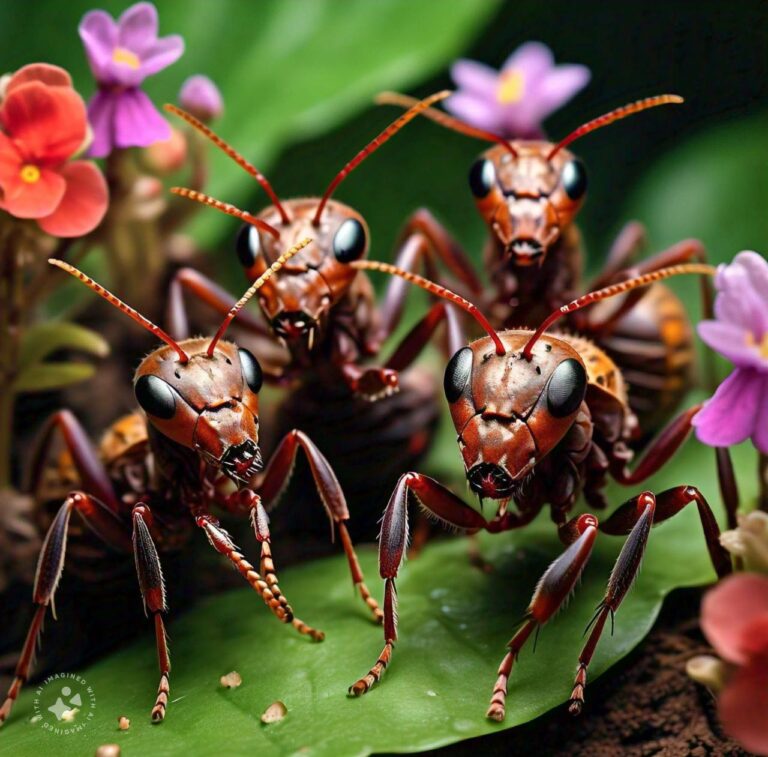The queen ant plays a vital role in an ant colony, acting as the central figure responsible for the survival and growth of the entire community. Her primary role is to lay eggs, ensuring a continuous supply of worker ants, soldiers, and new queens. Depending on the species, a queen ant can live for several years and produce thousands or even millions of eggs during her lifetime. She secretes pheromones that help maintain order within the colony, guiding the behavior and roles of other ants.
While the queen does not directly manage the colony, her influence ensures that the workers perform necessary tasks like foraging, caring for the young, and defending the nest. If the queen dies or fails to reproduce, the colony’s survival is at risk. Thus, protecting the queen is a top priority for worker ants, as she is the foundation of the colony’s stability and growth.
Queen ants are responsible for founding and populating ant colonies. After leaving their birth nest, queen ants mate and find a location to build a nest. Once the nest is ready, she will lay eggs. After these eggs develop, her job is to continue laying eggs. Worker ants will take care of the nest and forage for food. Queen ants don’t have any authority over worker ants. The only special treatment she gets is other ants feeding and grooming her.
What Happens When the Queen Ant Dies
Colonies with one queen won’t usually survive without her. The colony will eventually die off since new eggs aren’t being laid. Most ant species will reject a new queen. Some species will promote a worker ant. Species with multiple queens are more likely to accept a new queen. Protecting the queen is important to help ensure the survival of the colony.
Fun Facts About Queen Ants
–Queen ants live longer than other members of the colony. They can live between 10-30 years.
-Though queen ants have wings, they don’t fly very often. You’ll usually spot these ants in the air during their nuptial flight.
-Future queen ants are known as princesses until they leave the nest and mate.
-Queens will do whatever it takes to survive even if it leads to the downfall of their colony.
-Queen ants often have other ants surrounding them. These ants are the ones who feed and groom the queen.
-Queen ants can be overthrown, especially in colonies with multiple queens. Worker ants are more likely to kill the queen who is less fertile.
-Queen ants may not rule over a kingdom, but they are still critical members of the colony. Without these royal bugs, colonies wouldn’t be established or grow.
The Queen Ant is the Backbone of Ant Society
A study by Suhana Shree of Ashoka Trust for Research in Ecology and the Environmental , Institute, Bangalore.
Suhana Shree, a researcher at Ashoka Environmental Research, has conducted an in-depth study on the fascinating role of queen ants in ant colonies. Her research provides valuable insights into the biological and social dynamics that make queen ants critical to the survival and prosperity of ant colonies.
The queen ant is the reproductive leader of an ant colony, and her primary function is to produce offspring. Unlike worker ants, which are sterile females, the queen is equipped with fully developed reproductive organs. The life of a queen ant begins similarly to other ants, as she hatches from a fertilized egg. However, she is usually raised under special conditions, receiving better nutrition and care, which enable her to develop into a queen rather than a worker. Once fully grown, she embarks on a nuptial flight to mate with male ants from other colonies. After mating, the queen stores the sperm in a specialized organ called the spermatheca, allowing her to fertilize eggs for the rest of her life.
A queen ant’s lifespan can vary dramatically between species, but in some cases, she can live up to 20 years, far outliving her workers, who typically have a much shorter life span. The queen has a profound influence on the colony’s structure and behavior through pheromones, which regulate the activities of worker ants and suppress the development of new queens.
Shree’s study emphasises the queen’s central role in maintaining the colony’s genetic diversity, population control, and social harmony. Her research also highlights the adaptability of ant colonies, showcasing how they respond to changes in the queen’s health or death by either producing new queens or shifting colony behaviour.







